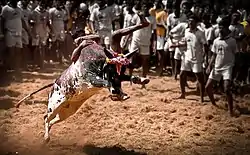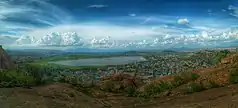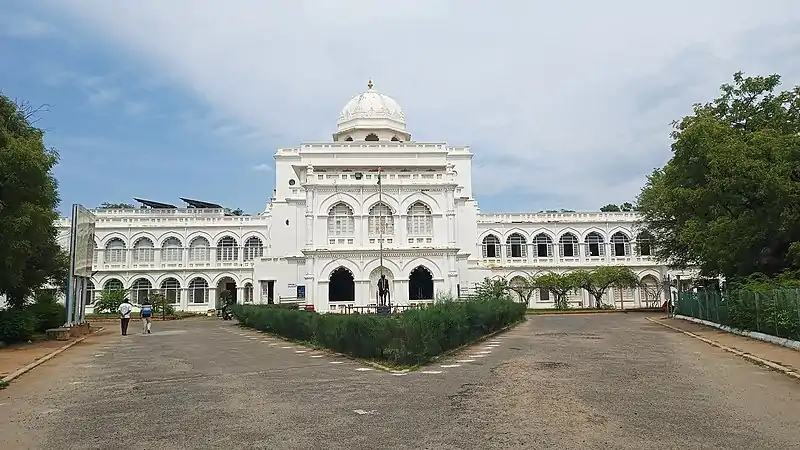Madurai
Madurai (/ˈmædjʊraɪ/ MA-DHU-RYE,[4][5] also US: /ˌmɑːdəˈraɪ/ MAH-də-RYE,[5][6][7] Tamil: [mad̪uɾaɪ̯]) is a major city in the Indian state of Tamil Nadu. It is the cultural capital of Tamil Nadu and the administrative headquarters of Madurai District. As of the 2011 census, it was the third largest Urban agglomeration in Tamil Nadu after Chennai and Coimbatore and the 44th most populated city in India.[8] Located on the banks of River Vaigai, Madurai has been a major settlement for two millennia and has a documented history of more than 2500 years. It is often referred to as "Thoonga Nagaram", meaning "the city that never sleeps".[9]
Madurai | |
|---|---|
From top, left to right: Meenakshi Temple, Thirumalai Nayakkar Mahal, Gandhi Museum, Madurai Junction, Jallikattu at Alanganallur, Madurai Airport, Vaigai river and Thiruparankundram aerial view | |
| Nickname: The city that never sleeps | |
 Madurai Madurai, Tamil Nadu  Madurai Madurai (India) | |
| Coordinates: 9.925200°N 78.119800°E | |
| Country | |
| State | Tamil Nadu |
| District | Madurai district |
| Government | |
| • Type | Municipal Corporation |
| • Body | Madurai City Corporation |
| • Mayor | V. Indirani ponVasanth, DMK |
| • District Collector | Dr. Aneesh Shekar IAS |
| • Commissioner of Police | Thiru Prem Anand Sinha IPS[1] |
| • Corporation Commissioner | Dr. K.P.Karthikeyan IAS |
| Area | |
| • Metropolis | 147.97 km2 (57.13 sq mi) |
| • Rank | 3 |
| Elevation | 134 m (440 ft) |
| Population (2011)[2] | |
| • Metropolis | 1,017,865[lower-alpha 1] |
| • Rank | 44th |
| • Metro | 1,465,625 |
| • Metro rank | 31st |
| Language | |
| • Official | Tamil, English |
| Time zone | UTC+5:30 (IST) |
| PIN | 625 xxx |
| Telephone code | 0452 |
| Vehicle registration | TN-58 (South), TN-58A (Tirumangalam), TN-58Y (Usilampatti),TN-59 (North), TN-59V (Vadipatti), TN-59W (Melur) and TN-64(Central) |
| Website | maduraicorporation |
Madurai is closely associated with the Tamil language. The third Tamil Sangam, a major congregation of Tamil scholars said to have been held in the city. The recorded history of the city goes back to the 3rd century BCE, being mentioned by Megasthenes, the Greek ambassador to the Maurya empire, and Kautilya, a minister of the Mauryan emperor Chandragupta Maurya. Signs of human settlements and Roman trade links dating back to 300 BCE are evident from excavations by Archeological Survey of India in Manalur.[10][11][12] The city is believed to be of significant antiquity and has been ruled, at different times, by the Pandyas, Cholas, Madurai Sultanate, Vijayanagar Empire, Madurai Nayaks, Carnatic kingdom, and the British East India Company British Raj.
The city has a number of historical monuments, with the Meenakshi Temple and the Thirumalai Nayak Palace being the most prominent. Madurai is an important industrial and educational hub in South Tamil Nadu. The city is home to various automobile, rubber, chemical and granite manufacturing industries.[13]
Madurai has important government educational institutes such as the Madurai Medical College, Homeopathic Medical College,[14] Madurai Law College, Agricultural College and Research Institute. Madurai city is administered by a municipal corporation established in 1971 as per the Municipal Corporation Act. The city covers an area of 147.97 km2 (57.13 sq mi) and had a population of 1,470,755 in 2011.[15] The city is also the seat of a bench of the Madras High Court. The Madurai Bench has been functioning since 2004.
Etymology
According to Iravatham Mahadevan, a 2nd-century BCE Tamil-Brahmi inscription refers to the city as matiray, an Old Tamil word meaning a "walled city".[16]
Madurai is one of the many temple towns in the state which is named after the groves, clusters or forests dominated by a particular variety of a tree or shrub and the same variety of tree or shrub sheltering the presiding deity. The region is believed to have been covered with Kadamba forest and hence called Kadambavanam.[17] The city is referred by various names including "Madurai", "Koodal", "Malligai Maanagar", "Naanmadakoodal" and "Thirualavai". The word Madurai may be derived from Madhura (sweetness) arising out of the divine nectar showered on the city by the Hindu god Siva from his matted hair.[18] Another theory is that Madurai is the derivative of the word Marutham, which refers to the type of landscape of the Sangam age. A town in the neighbouring Dindigul district is called Vada Madurai (North Madurai) and another in Sivagangai district is called Manamadurai. The different names by which the city has been referred to historically are listed in the 7th-century poem Thiruvilayaadal Puraanam written by Paranjothi Munivar.[18][19] Vaishnava texts refer to Madurai as the "southern Mathura", probably similar to Tenkasi (southern Kashi).[20][21]
Koodal means an assembly or congregation of scholarly people, referring to the three Tamil Sangams held at Madurai. Naanmadakoodal, meaning the junction of four towers, refers to the four major temples for which Madurai was known for.[18] Tevaram, the 7th- or 8th-century Tamil compositions on Shiva by the three prominent Nayanars (Saivites), namely Appar,[22] Sundarar and Thirugnanasambandar,[23][24] address the city as Thirualavai.[18][25]
History
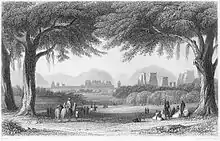
Madurai is mentioned in the great book Mahavamsa, that in the 6th century BCE, Prince Vijaya(BCE 543–505) married the daughter of King Pandu of Madurai and 700 men of prince Vijaya married 700 maidens from Madurai as their wives. The princess and maidens were sent to Sri Lanka with valuable items by ships and they landed in MahaTittha, present-day Mannar.[26] Madurai has been inhabited since at least the 3rd century BCE.[27] Megasthenes may have visited Madurai during the 3rd century BCE, with the city referred as "Methora" in his accounts.[18] The view is contested by some scholars who believe "Methora" refers to the north Indian city of Mathura, as it was a large and established city in the Mauryan Empire.[28] Madurai is also mentioned in Kautilya's (370–283 BCE)[29] Arthashastra.[18] Sangam literature like Maturaikkāñci records the importance of Madurai as a capital city of the Pandyan dynasty.[30][31] Madurai is mentioned in the works of Roman historians Pliny the Younger (61 – c. 112 CE), Ptolemy (c. 90 – c. CE 168), those of the Greek geographer Strabo (64/63 BCE – c. 24 CE),[32] and also in Periplus of the Erythraean Sea.[19]

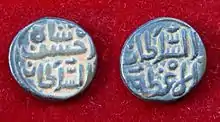
After the Sangam age, most of present-day Tamil Nadu, including Madurai, came under the rule of the Kalabhra dynasty,[33] which was ousted by the Pandyas around 590 CE.[34][35] The Pandyas were ousted from Madurai by the Chola dynasty during the early 9th century.[36]No mention of Madurai The city was fought over between the Cholas and the Pandyas during the 12th century, changing hands several times,[37] until the early 13th century, when the second Pandyan empire was established with Madurai as its capital.[36] After the death of Kulasekara Pandian (1268–1308 CE), Madurai came under the rule of the Delhi Sultanate.[36] The Madurai Sultanate then seceded from Delhi and functioned as an independent kingdom until its gradual annexation by the Vijayanagar Empire in 1378 CE. Madurai became independent from Vijayanagar in 1559 CE under the Nayaks.[38] Nayak rule ended in 1736 CE and Madurai was repeatedly captured several times by Chanda Sahib (1740 – 1754 CE), Arcot Nawab and Muhammed Yusuf Khan (1725 – 1764 CE) in the middle of the 18th century.[18]
In 1801, Madurai came under the direct control of the British East India Company and was annexed to the Madras Presidency.[39][40] The British government made donations to the Meenakshi temple and participated in the Hindu festivals during the early part of their rule. The city evolved as a political and industrial complex through the 19th and 20th centuries to become a district headquarters of a larger Madurai district.[41] In 1837, the fortifications around the temple were demolished by the British.[42] The moat was drained and the debris was used to construct new streets – Veli, Marat and Perumaal Mesthiri streets.[43] The city was constituted as a municipality in 1866 under the Town Improvement Act of 1865.[44] The British government faced initial hiccups during the earlier period of the establishment of municipality in land ceiling and tax collection in Madurai and Dindigul districts under the direct administration of the officers of the government. The city, along with the district, was resurveyed between 1880 and 1885 CE and subsequently, five municipalities were constituted in the two districts and six taluk boards were set up for local administration. Police stations were established in Madurai city, housing the headquarters of the District Superintendent.[45]
It was in Madurai, in 1921, that Mahatma Gandhi, pre-eminent leader of Indian nationalism in British-ruled India, first adopted the loin cloth as his mode of dress after seeing agricultural labourers wearing it.[46] Leaders of the independence movement in Madurai included N.M.R. Subbaraman,[47][48] Karumuttu Thiagarajan Chettiar and Mohammad Ismail Sahib.[49] The Temple Entry Authorization and Indemnity Act passed by the government of Madras Presidency under C. Rajagopalachari in 1939 removed restrictions prohibiting Shanars and Dalits from entering Hindu temples. The temple entry movement was first led in Madurai Meenakshi temple by independence activist A. Vaidyanatha Iyer in 1939.[50][51]
In 1971, the municipality of Madurai was upgraded to a Municipal Corporation.[52] In 2011 the Madurai Corporation expanded the area of its jurisdiction from seventy-two wards to one hundred wards, an increase in area from 51.82 square kilometres (12,810 acres) to 147.997 square kilometres (36,571 acres).[52]
Architecture
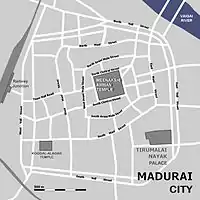
Madurai is built around the Meenakshi Amman Temple, which acted as the geographic and ritual centre of the ancient city of Madurai. The city is divided into a number of concentric quadrangular streets around the temple.[53] Vishwanatha Nayak (1529–64 CE), the first Madurai Nayak king, redesigned the city in accordance with the principles laid out by Shilpa Shastras (Sanskrit: śilpa śāstra, also anglicised as silpa sastra meaning rules of architecture) related to urban planning. These squares retain their traditional names of Aadi, Chittirai, Avani-moola and Masi streets, corresponding to the Tamil month names and also to the festivals associated.[53] The temple prakarams (outer precincts of a temple) and streets accommodate an elaborate festival calendar in which dramatic processions circumambulate the shrines at varying distances from the centre. The temple chariots used in processions are progressively larger in size based on the size of the concentric streets.[54] Ancient Tamil classics record the temple as the centre of the city and the surrounding streets appearing liken a lotus and its petals.[19] The city's axes were aligned with the four-quarters of the compass, and the four gateways of the temple provided access to it. The wealthy and higher echelons of the society were placed in streets close to the temple, while the poorest were placed in the fringe streets. With the advent of British rule during the 19th century, Madurai became the headquarters of a large colonial political complex and an industrial town; with urbanisation, the social hierarchical classes became unified.[53]
Geography and climate
The municipal corporation of Madurai has an area of 147.97 square kilometres or 57.13 square miles.[55]
Madurai is located at 9.93°N 78.12°E.[56] It has an average elevation of 134 metres. The city of Madurai lies on the flat and fertile plain of the river Vaigai, which runs in the northwest–southeast direction through the city, dividing it into two almost equal halves.[57] The Sirumalai and Nagamalai hills lie to the north and west of Madurai. The land in and around Madurai is utilised largely for agricultural activity, which is fostered by the Periyar Dam.[58] Madurai lies southeast of the western ghats, and the surrounding region occupies the plains of South India and contains several mountain spurs.[59] The soil type in central Madurai is predominantly clay loam, while red loam and black cotton types are widely prevalent in the outer fringes of the city. Paddy is the major crop, followed by pulses, millet, oil seed, cotton and sugarcane.[60]
As is typical for Tamil Nadu, Madurai has a tropical savanna climate (Köppen Aw/As), although it borders closely upon a hot semi-arid climate (BSh).
Madurai is hot and dry for eight months of the year. Cold winds are experienced during February and March as in the neighbouring Dindigul. The hottest months are from March to July. The city experiences a moderate climate from August to October, tempered by heavy rain and thundershowers, and a slightly cooler climate from November to February. Fog and dew are rare, occurring only during the winter season. Being equidistant from mountains and the sea, it experiences similar monsoon pattern with Northeast monsoon and Southwest monsoon, with the former providing more rain during October to December.[61] The average annual rainfall for the Madurai district is about 85.76 cm.[62]
Temperatures during summer generally reach a maximum of 42 °C or 107.6 °F and a minimum of 26.3 °C or 79.3 °F, although temperatures up to 43 °C or 109.4 °F are not uncommon.[63] Winter temperatures range between 29.6 °C or 85.3 °F and 18 °C or 64.4 °F. A study based on the data available with the Indian Meteorological Department on Madurai over a period of 62 years indicate rising trend in atmospheric temperature over Madurai city, attributed to urbanisation, growth of vehicles and industrial activity.[63] The maximum temperature of 42 °C or 107.6 °F for the decade of 2001 to 2010 was recorded in 2004 and in 2010.[63]
| Climate data for Madurai, India (1981-2010) | |||||||||||||
|---|---|---|---|---|---|---|---|---|---|---|---|---|---|
| Month | Jan | Feb | Mar | Apr | May | Jun | Jul | Aug | Sep | Oct | Nov | Dec | Year |
| Record high °C (°F) | 39.1 (102.4) |
38.5 (101.3) |
41.7 (107.1) |
42.1 (107.8) |
44.5 (112.1) |
42.2 (108.0) |
40.6 (105.1) |
40.0 (104.0) |
39.8 (103.6) |
40.0 (104.0) |
38.0 (100.4) |
37.0 (98.6) |
44.5 (112.1) |
| Average high °C (°F) | 30.8 (87.4) |
33.3 (91.9) |
36.0 (96.8) |
37.2 (99.0) |
37.9 (100.2) |
37.2 (99.0) |
36.5 (97.7) |
36.2 (97.2) |
35.1 (95.2) |
33.1 (91.6) |
30.6 (87.1) |
30.0 (86.0) |
34.5 (94.1) |
| Average low °C (°F) | 19.6 (67.3) |
21.5 (70.7) |
23.4 (74.1) |
25.6 (78.1) |
26.3 (79.3) |
26.2 (79.2) |
25.9 (78.6) |
25.5 (77.9) |
24.6 (76.3) |
23.7 (74.7) |
22.7 (72.9) |
21.3 (70.3) |
23.9 (75.0) |
| Record low °C (°F) | 15.6 (60.1) |
10.5 (50.9) |
16.9 (62.4) |
19.4 (66.9) |
17.8 (64.0) |
17.8 (64.0) |
19.4 (66.9) |
20.6 (69.1) |
18.5 (65.3) |
18.9 (66.0) |
17.2 (63.0) |
16.7 (62.1) |
10.5 (50.9) |
| Average precipitation mm (inches) | 8.5 (0.33) |
11.0 (0.43) |
18.3 (0.72) |
60.1 (2.37) |
80.6 (3.17) |
34.3 (1.35) |
56.9 (2.24) |
93.9 (3.70) |
121.5 (4.78) |
185.8 (7.31) |
147.2 (5.80) |
51.3 (2.02) |
869.4 (34.23) |
| Average precipitation days | 0.8 | 1.1 | 1.2 | 3.3 | 4.0 | 2.2 | 2.9 | 4.6 | 6.6 | 9.7 | 6.8 | 3.4 | 46.6 |
| Average relative humidity (%) | 77 | 77 | 76 | 72 | 70 | 68 | 70 | 71 | 71 | 76 | 78 | 78 | 74 |
| Average ultraviolet index | 7 | 7 | 8 | 8 | 8 | 8 | 8 | 8 | 7 | 7 | 6 | 6 | 7 |
| Source 1: Indian Meteorological Department Mean data from 1981–2010[64][65] | |||||||||||||
| Source 2: Weather Atlas[66] | |||||||||||||
Demographics

| Year | Pop. | ±% |
|---|---|---|
| 1951 | 361,781 | — |
| 1961 | 424,810 | +17.4% |
| 1971 | 549,114 | +29.3% |
| 1981 | 820,891 | +49.5% |
| 1991 | 940,989 | +14.6% |
| 2001 | 928,869 | −1.3% |
| 2011 | 1,017,865 | +9.6% |
| Source: | ||
According to 2011 census based on pre-expansion limits, the area covered under the Madurai Municipal Corporation had a population of 1,017,865[3] with a sex-ratio of 999 females for every 1,000 males, much above the national average of 929.[70] A total of 100,324 were under the age of six, constituting 51,485 males and 48,839 females. Scheduled Castes and Scheduled Tribes accounted for 6.27% and .31% of the population respectively. The average literacy of the city was 81.95%, compared to the national average of 72.99%.[15] The urban agglomeration of Madurai had a population of 1,465,625,[71] and is the third largest in Tamil Nadu and the 31st in India.[72][73]
According to the religious census of 2011, Madurai had 85.83% Hindus, 8.54% Muslims, 5.18% Christians and 0.47% others.[74] Tamil is the main language, and the standard dialect is the Madurai Tamil dialect, and is spoken by 89.0% of the population.[75] Saurashtra, a language related to Gujarati, is the largest minority language which is spoken by 5.4% of the population. Other significant minority languages include Telugu (2.7%) and Urdu (1.5%).[76] Roman Catholics in Madurai are affiliated with the Roman Catholic Diocese of Madurai,[77] while Protestants are affiliated with the Madurai-Ramnad Diocese of the Church of South India.[78]
In 2001, Slum-dwellers comprise 32.6 per cent of the total population, much higher than the national average of 15.05 per cent.[79][80] The increase in growth rate to 50 per cent from 1971 to 1981 is due to the city's upgrade to a municipal corporation in 1974 and the subsequent inclusion of 13 Panchayats into the corporation limits. The decline in the population growth rate between 1981 and 2001 is due to the bifurcation of Madurai district into two, Madurai and Dindigul in 1984, and the subsequently of part of the city into the Theni district in 1997. The compounded annual growth rate dropped from 4.10 per cent during 1971–81 to 1.27 per cent during 1991–2004.[81]
Administration and politics
| Municipal Corporation Officials | ||||
|---|---|---|---|---|
| Mayor | Mrs.Indirani Ponvasanth[82] | |||
| Commissioner | Visagan[83] | |||
| Deputy Mayor | seat vacant[84] | |||
| Members of Legislative Assembly | ||||
| Madurai Central | P.T.R. Palanivel Thiagarajan[85] | |||
| Madurai East | P.Moorthy[85] | |||
| Madurai North | G. Thalapathi[85] | |||
| Madurai South | M. Boominathan[85] | |||
| Madurai West | Sellur K. Raju[85] | |||
| Thiruparankundram | [86] V. V. Rajan Chellappa | |||
| Thirumangalam | R.B.Udhayakumar[85] | Members of Parliament | ||
| Madurai | S. Venkatesan[87] | |||
| Virudhunagar | Manicka Tagore[88] | |||
The municipality of Madurai was constituted on 1 November 1866 as per the Town Improvement Act of 1865.[44] The municipality was headed by a chairperson and elections were regularly conducted for the post except during the period 1891 to 1896, when no elections were held due to violent factionalism. During the early years of independent India, the Madurai municipality was dominated by reformists of the Indian National Congress.[89] Madurai was upgraded to a municipal corporation on 1 May 1971 as per the Madurai City Municipal Corporation Act, 1971.[90] It is the second oldest municipal corporation in Tamil Nadu, after Chennai.[91] The functions of the municipality are devolved into six departments: General, Engineering, Revenue, Public Health, Town planning and the Computer Wing. All these departments are under the control of a Municipal Commissioner, who is the supreme executive head.[92] The legislative powers are vested in a body of 100 members, one each from the 100 wards. The legislative body is headed by an elected Mayor assisted by a Deputy Mayor.[93] The corporation received several awards in 2008 for implementing development works.[94]
The city of Madurai is represented in the Tamil Nadu Legislative Assembly by six elected members, one each for the Madurai East, Madurai West, Madurai North, Madurai Central, Madurai South and Thirupparankundram constituencies.[95] Most of Madurai city comes under the Madurai Lok Sabha constituency and elects a member to the Lok Sabha, the lower house of the Parliament of India, once every five years.[96] From 1957, the Madurai parliament seat was held by the Indian National Congress seven times in the 1962–67,[97] 1971–77,[98] 1977–80,[99] 1980–84,[100] 1984–89,[101] 1989–91[102] and 1991 elections.[103] The Communist Party of India (Marxist) won the seat three times during 1967–71,[104] 1999–2004[105] and 2004–09[106] general elections. The Communist Party of India (1957–61[107]), Tamil Maanila Congress (Moopanar) (1996–98[108]), Janata Party (1998[109]), Dravida Munnetra Kazhagam (2009–2014)[110] and All India Anna Dravida Munnertra Kazhagam (2014–2020)[87] have each won once. Part of the city which falls under Thirupparankundram assembly constituency comes under the Virudhunagar Lok Sabha constituency.[88]
Law and order is enforced by the Tamil Nadu Police, which, for administrative purposes, has constituted Madurai city as a separate district. The district is divided into four sub-divisions, namely Thallakulam, Anna Nagar, Thilagar Thidal and Town,[111] with a total of 27 police stations.[112] The Madurai city police force is headed by a Commissioner of police, assisted by Deputy Commissioners. Enforcement of law and order in the suburban areas are handled by the Madurai district police.[113] In 2008, the crime rate in the city was 283.2 per 100,000 people, accounting for 1.1 per cent of all crimes reported in major cities in India, and it was ranked 19th among 35 major cities in India. As of 2008, Madurai recorded the second highest SLL (Special and Local Laws) crimes, at 22,728, among cities in Tamil Nadu. However, Madurai had the second lowest crime rate at 169.1 of all the cities in Tamil Nadu.[114] The city is also the seat of a bench of the Madras High Court, one of only a few outside the state capitals of India. It started functioning in July 2004.[115]
Transport
Road
The National Highways NH-44, NH-38 and NH-85 pass through Madurai.[116] The state highways passing through the city are SH-33, SH-72, SH-72A, SH-73 and SH-73A which connect various parts of Madurai district. Madurai is one of the seven circles of the Tamil Nadu State Highway network.[117] Madurai is the headquarters of the Tamil Nadu State Transport Corporation (Madurai) and provides local and inter-city bus transport across the districts of Madurai, Dindigul, Sivagangai, Theni, Virudhunagar.[118] Madurai has three bus terminals, namely, M.G.R. Bus Stand aka Mattuthavani bus stand is the second largest bus terminus in Tamilnadu after Chennai Mofussil Bus terminus.
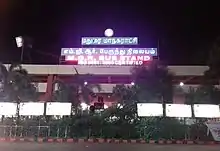
Arappalayam (for inter city buses)
Periyar Bus Stand (for intra city buses).[119] There are 12,754 registered three-wheeled vehicles called auto rickshaws, which are commercially available for renting within the city. In addition to the government operated city buses, there are 236 registered private mini-buses that support local transportation.[120]
Rail
Madurai Junction is the major railway station serving the city. It is an important railway junction in southern Tamil Nadu and is one of the top 100 booking stations in Indian Railways. It is the headquarters of the Madurai division of the Southern Railway.[121] There are direct trains from connecting Madurai with major cities and towns across India.[122] The state government announced a monorail project for Madurai called as Madurai Monorail in 2011, which is in planning stages.[123]
Air
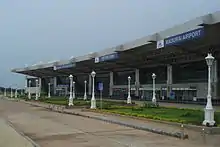
Madurai airfield was first used by the Royal Air Force in World War II in 1942.[124] The first passenger flight, a Fokker Friendship aircraft was from Madras in 1956. Madurai Airport established in 1957, is located at Avaniyapuram, about 12 kilometres (7.5 mi) from the city.[125][126] The airport was declared a customs airport in 2012 allowing limited number of international flights.[127] It offers domestic flights to some cities in India and international services to Colombo, Dubai and for Singapore on a daily basis started by Air India Express since February 2018.[128] The carriers operating from the airport are Air India, Air India Express, SpiceJet, IndiGo and Srilankan Airlines.[129] The airport handled 842,300 passengers between April 2015 and March 2016.[130][131] The airport identified as one of 35 non-metro airports for modernisation had a new integrated terminal building, which was inaugurated on 12 September 2010.[132]
Metro Rail
In 2021,The Tamil Nadu Government under Chief Minister M.K. Stalin proposed a metro for the city of Madurai.[133][134]
Sea
The nearest major port is V. O. Chidambaranar Port Trust in Thoothukudi located nearly 150 km (93 mi) away from Madurai connecting with NH38 National Highway and 143 km (89 mi) from Madurai Airport which acts several industrial sectors to operate. There are several import and exporting activities in Thoothukudi harbour to various countries like Singapore and Colombo. An initiative process by the Tamil Nadu government has announced to develop Madurai-Thoothukudi Industrial Corridor in the year of 2014 by the finance minister at the estimated cost of ₹1,83,819 Crore and it covers 13 districts and fund released by Tamil Nadu Infrastructure Fund Management Company Ltd[135]
Education
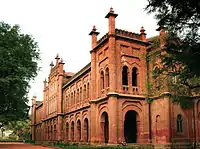
Madurai has been an academic centre of learning for Tamil culture, literature, art, music and dance for centuries.[136] All three assemblies of the Tamil language, the Tamil Sangam (about the 3rd century BCE to the 3rd century CE), were said to have been held at Madurai.[137] Tamil poets of different epochs participated in these assemblies, and their compositions are referred to as Sangam literature.[32] During the third Tamil sangam, the comparative merit of the poets was decided by letting the works float in the lotus tank of the temple. It was believed that a divine force would cause the work of superior merit to float on the surface, while the inferior ones would sink.[136][138]
The American College is the oldest college in Madurai, and was established in 1881 by American Christian missionaries.[139] The Lady Doak college, established in 1948, is the oldest women's college in Madurai.[140] Thiagarajar College (established in 1949), Madura College (established in 1889),[141] Fatima College (established in 1953),[142] Sourashtra College (established in 1967) and M.S.S. Wakf Board College (established in 1964), Tamil Nadu Polytechnic College ( established in 1946),[143] are the oldest educational institutions of the city. Madurai Kamaraj University (originally called Madurai University), established in 1966, is a state-run university which has 109 affiliated arts and science colleges in Madurai and neighbouring districts. There are 47 approved institutions of the university in and around the city, consisting of autonomous colleges, aided colleges, self-financing colleges, constituent colleges, evening colleges and other approved institutions.[144] There are seven polytechnical schools and five Industrial training institutes (ITIs) in Madurai, with the Government ITI and the Government Polytechnic for Women being the most prominent of them all. There are two government medical institutes in Madurai, Madurai Medical College and Homoeopathic Medical College, Thirumangalam and 11 paramedical institutes. There are fifteen engineering colleges in Madurai affiliated to Anna University, with the Thiagarajar College of Engineering being the oldest.[14] The Madurai Law College, established in 1979, is one of the seven government law colleges in the state. It is administered by the Tamil Nadu Government Department of Legal Studies, and affiliated with the Tamil Nadu Dr. Ambedkar Law University.[145] There are three teacher training institutes, two music colleges, three management institutes and 30 arts and sciences colleges in Madurai.[14] The agricultural college and research institute in Madurai, started in 1965 by the state government, provides agricultural education to aspirants in the southern districts of Tamil Nadu.[146] There are a total of 369 primary, secondary and higher secondary schools in the city.[147] AIIMS, a premier medical institution, is also under construction in Madurai and will cover 224 acres of land, at an estimated cost of ₹ 1,264 crore, and additionally allotted 736 crore total around 2,000 crore in the sub-urban Thoppur Madurai district.[148]
Economy
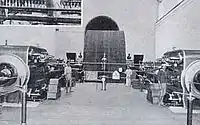
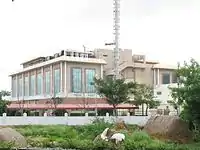
Madurai was traditionally an agrarian society, with rice paddies as the main crop. Cotton crop cultivation in the regions with black soil in Madurai district was introduced during the Nayaka rule during the 16th century to increase the revenue from agriculture.[149] The paddy fields cultivated in the Vaigai delta across Madurai North, Melur, Nilakottai and Uthamapalayam are known as "double-crop paddy belts". Farmers in the district supplement their income with subsidiary occupations like dairy farming, poultry-farming, pottery, brick making, mat-weaving and carpentry.[150] Madurai is famed for its jasmine plantations, called "Madurai Malli", primarily carried out at the foothills of Kodaikanal hills and traded at the Madurai morning flower market. An average of 2,000 farmers sell flowers daily at the flower market.[136]
With the advent of Small Scale Industries (SSI) after 1991, the industrialisation of Madurai increased employment in the sector across the district from 63,271 in 1992–93 to 166,121 persons in 2001–02.[151] Madurai is one of the few rubber growing areas in South India,[152] and there are rubber-based industries in Madurai. Gloves, sporting goods, mats, other utility products and automobile rubber components are the most produced items by these industries. Automobile manufacturers are the major consumers of rubber components produced in the city.[13] There are numerous textile, granite and chemical industries operating in Madurai.[153]
Madurai is promoted as a tier II city for IT and Industry. kappalur which is sub-urban of Madurai is business hub for automotive industries such as KUN BMW, Isuzu, Volkswagen, Toyota, Mahindra, Tata, Maruti Suzuki, Mitsubishi, Ashok Leyland, Jeep, Fiat India (FCA). The government has created Utchapatti-Thoppur satellite Township in Kappalur. Small Industries Development Corporation Kappalur has many polymer and houseware manufacturing units.some software companies have opened their offices in Madurai.[154] Software Technology Parks of India, an agency of the Government of India, has authorised several such companies to receive benefits under its national information technology development program. The state government proposed two IT-based Special Economic Zones (SEZ) in Madurai, and these have been fully occupied by various IT companies, HCL Technologies and Honeywell have their own campuses in ELCOT IT Park in Madurai.[155][156] [157]
Religious sites
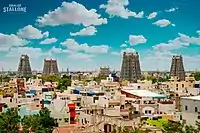
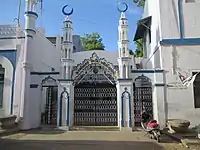

Meenakshi Amman Temple is a historic Hindu temple located on the south side of the Vaigai River in Madurai and is one of the most prominent landmarks of the city.[137] It is dedicated to Meenakshi and her consort, Sundareswarar.[136] The complex houses 14 gopurams (gateway towers) ranging from 45–50 metres (148–164 ft) in height, the tallest being the southern tower, 51.9 metres (170 ft) high. There are also two golden sculptured vimana (shrines) over the sanctum of the main deities. The temple is a significant symbol for Tamils and has been mentioned since antiquity in Tamil literature, though the present structure was built between 1623 and 1655 CE.[53][158] As of 2016, the temple attracts on average 15,000 visitors a day, which grows to around 25,000 on Fridays.[159] There are an estimated 33,000 sculptures in the temple,[160] and it was in the list of top 30 nominees for the "New7Wonders of the World".[161]
Koodal Azhagar Temple is a Vishnu temple located in the city. It has idols of the Navagraha (nine planet deities), which are otherwise found only in Shiva temples.[162][163]
Alagar Koyil is a celebrated Vishnu temple 21 kilometres (13 mi) northeast of Madurai situated on the foothills of Solaimalai.[164] The deity, Kallazhagar, is believed to be the brother of Meenakshi, the presiding deity at the Meenakshi temple.[32] The festival calendars of these two temples overlap during the Meenakshi Thirukalyanam festival.[165]
Tirupparankunram is a hill 8 kilometres (5.0 mi) away from Madurai where the Hindu god Murugan is said to have married Deivanai. The temple is the first among the Six Abodes of Murugan and is one of the most visited tourist spots in Madurai, next only to the Meenakshi Amman Temple.[166] The temple has a wide range of Hindu gods carved on the walls.[164]
Kazimar Big Mosque is the oldest Islamic place of worship in the city. It was constructed under the supervision of Kazi Syed Tajuddin, who was a descendant of Islamic Prophet Muhammad. Madurai Maqbara the grave of Meer Ahmad Ibrahim Periya Hazrat, Meer Amjad Ibrahim Chinna Hazrat and Syed Abdus Salam Ibrahim Saalim Hazrat is located inside the mosque.[167] Kazi Syed Tajuddin came from Oman and received the piece of land as a gift from the Pandyan ruler Kulasekara Pandyan I, during the 13th century for the construction of the mosque.[136][167][168] Since its inception until today the mosque has been managed by descendants of Kazi Syed Tajuddin and traditionally the Kazis of Madurai city to the Govt. of Tamil Nadu are appointed from the descendants family.[169] Goripalayam Mosque is located in Gorippalayam, the name of which is derived from the Persian word gor ("grave") and the graves of erstwhile Sultanate rulers Alauddin, Shamsuddeen and Habibuddin are found here.[170] Tirupparankunram Dargah is located at the top of the Thiruparankundram hill where the cemetery of Sultan Sikandhar Badushah the then ruler of Jeddah and Madurai who travelled to India along with Sulthan Syed Ibrahim Shaheed of Ervadi during the 12th century is located.[170] St. Mary's Cathedral is the seat of the Roman Catholic Archdiocese of Madurai.[77] Samanar Malai and Panchapandavar Malai are important Jain centres.[171]
Culture and tourism
Madurai is popularly called Thoonga Nagaram meaning the city that never sleeps, on account of the active night life.[172] The city attracts a large number of tourists from within the country and abroad. About 9,100,000 tourists visited Madurai in 2010, including 524,000 foreigners.[173] Madurai is now attracting medical tourism also.[174] The palace complex of Thirumalai Nayak Palace was constructed in the Indo-Saracenic style by Thirumalai Nayakar in 1636 CE. It is a national monument maintained by the Tamil Nadu Archaeological Department. The daily sound and light show organised by the department explains the virtues of King Thirumalai and the features of the palace.[164] The palace of Rani Mangamma has been renovated to house one of the five Gandhi Sangrahalayas (Gandhi Memorial Museum, Madurai) in the country. It includes a part of the blood-stained garment worn by Mahatma Gandhi when he was assassinated by Nathuram Godse.[175] A visit by Dr.Martin Luther King Jr. to the museum inspired him to lead peaceful protests against discrimination.[176] The Eco park, situated in Tallakulam, features fountains and lighting in trees using optical fibres.[177] Rajaji children's park, maintained by the Madurai Municipal Corporation, is situated between the Gandhi museum and the Tamukkam grounds. It has a visitor average of 5000 per day during holidays and 2000–3000 on working days. Madurai also has Theme Park, Athisayam which is situated in Paravai, Madurai – Dindugal main road.[178] MGR Race Course Stadium is an athletic stadium which has a synthetic track and a swimming pool.[179] Several national meets are held here.[180] It also hosts several international and national level kabbadi championships.[181]
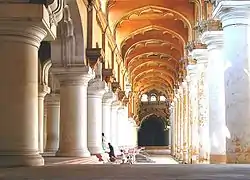
The people of Madurai celebrate numerous festivals, including Meenakshi Tirukkalyanam, the Chittirai Festival and the Car Festival. The annual 10-day Meenakshi Tirukalyanam festival, also called Chittirai festival, is celebrated during April–May every year and attracts one million visitors. Legend has it that the Hindu god Vishnu, as Alagar, rode on a golden horse to Madurai to attend the celestial wedding of Meenakshi (Parvati) and Sundareswarar (Shiva).Before Alagar reaches the wedding, the marriage will be completed and he does not cross the vaigai river. During this day there will be huge crowd will be present near the river too see Lord Alagar in the river. During the Cradle festival, the festive idols of Meenakshi and Sundareswarar are taken in procession to a mirror chamber and set on a rocking swing for nine days. Avanimoolam festival is celebrated during September when the 64 sacred games of Shiva, thiruvilayadal, are recited.[165] The Thepporchavam festival, or float festival, is celebrated on the full moon day of the Tamil month Thai, which falls around January – February, to celebrate the birth anniversary of King Thirumalai Nayak. The decorated icons of Meenakshi and her consort are taken out in a procession from the Meenakshi Temple to the Mariamman Teppakulam. The icons are floated in the tank on a raft decked with flowers and flickering lamps.[164] Jallikattu is one of the most popular historical sport in Tamil Nadu, and is a part of the Pongal festival (harvest festival) Mattu Pongal celebrated during January. The bull taming event is held in the villages surrounding Madurai, and people from the neighbouring villages throng to the open grounds to watch man and bull pitting their strength against each other.[165] The event was banned in the years 2014, 2015 and 2016 following an order by the Supreme Court of India.[182] Santhanakoodu festivals in Madurai are celebrated on various days during the Islamic calendar year to commemorate Islamic saints.[170] Entertainment included shopping malls such as Milan'em Mall and Vishaal de Mal is being the South Tamil Nadu's biggest large format shopping mall, is located in Chokkikulam, Madurai. theaters such as INOX Leisure Limited, Big Cinemas, Thangaregal, and more than ten are playing the vital role in entertainment industry in Madurai. Courtyard by Marriott, Taj Gateway Hotel Pasumalai, GRT Regency, The Heritage hotels, Germanus Hotel, Astoria, Kadambavanam Resort, Poppy's Hotel, Lake View Hotel and Madurai Residency are such a popular hotels. National Cricket Ground NPR College Ground is an artificial turf ground with a seating capacity of 5000 and flood lights. The ground has hosted 10 first class cricket matches and it is also a venue for Tamil Nadu Premier League located 42 km (26 mi) away from Madurai.
Nearest Popular Hill station are Kodaikanal 116 km (72 mi), Sirumalai 90 km (56 mi), Munnar 154 km (96 mi), Kumily 138 km (86 mi) from Madurai. Rameswaram is historical Hindu temple tourism center which is 170 km (110 mi) from Madurai well connected with Rail and road connectivity.
Media and utility services
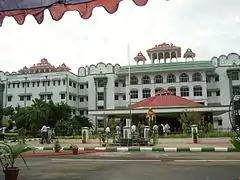
The city hosts several radio stations, including the state-owned All India Radio[183] and private channels like Hello FM, Radio Mirchi,[184] Suryan FM[185] and Radio City. The Hindu,[186] The New Indian Express[187] and The Times of India[188] are the three principal English-language daily newspapers which have Madurai editions. Deccan Chronicle, though not printed in the city, is another English-language daily newspaper available in the city.[189] The most read Tamil-language daily morning newspapers include Dina Malar,[190] Dina Thanthi,[191] Dina Mani[187] and Dinakaran[192] – all these newspapers have editions from Madurai. There are also daily Tamil evening newspapers like Tamil Murasu, Malai Murasu and Malai Malar[193] published in Madurai. Television broadcasting from Chennai for whole of Tamil Nadu was started on 15 August 1975.[194] Direct-to-home cable television services are provided by DD Direct Plus[195][196] and other private service providers.[197]
Electricity supply to the city is regulated and distributed by the Tamil Nadu Electricity Board (TNEB). The city is the headquarters of the Madurai region of TNEB and along with its suburbs, forms the Madurai Metro Electricity Distribution Circle, which is further divided into six divisions.[198] Water supply is provided by the Madurai City Corporation with overhead tanks and power pumps. In the period 2010–2011, a total of 950.6 lakh litres of water was supplied to 87,091 connections for households in Madurai.[199]
About 400 metric tonnes of solid waste are collected from the city every day by door-to-door collection, and the subsequent source segregation and dumping is carried out by the sanitary department of the Madurai Municipal corporation All the major channels in Madurai are linked by the corporation to receive the flood water from primary, secondary and tertiary drains constructed along the roadsides to dispose of rain water. The sewer system was first established by the British in Madurai in 1924 to cover the core city area, which covers 30 per cent of the present city area. It was further expanded in 1959 and 1983 by a corporation plan. The 2011 Jawaharlal Nehru National Urban Renewal Mission covered 90 per cent of households with underground drainage system.[200]
Madurai comes under the Madurai telecom district of the Bharat Sanchar Nigam Limited (BSNL), India's state-owned telecom and internet services provider. Both Global System for Mobile Communications (GSM) and Code division multiple access (CDMA) mobile services are available. Apart from telecom, BSNL also provides broadband internet service and Caller Line Identification (CLI) based internet service Netone.[201][202]
A regional passport office was opened on 17 December 2007 and caters to the needs of nine districts.[203] The city is served by the Government Rajaji Hospital.[204] A branch of All India Institutes of Medical Sciences in Thoppur, in the outskirts of the city, is set to be completed by 2022 as per Central government press release.[205]
Notable people
- Ameer, Indian actor and Film Director
- Gopi Shankar Madurai, Statutory Authority with Government of India.
- A. Muthukrishnan, (born 1973), Tamil author and social activist
- Narthaki Nataraj, Tamil Nadu Planning Commission Member.
- Prasanna Pandian (born 1984), artist, architect and an animator
- Sundar Pichai (born 1972), chief executive officer (CEO) of Alphabet Inc.
- Palanivel Thiagarajan (Indian politician and the current Finance Minister of Tamil Nadu)
- Vadivelu (born 1960),Indian actor, comedian and playback singer
See also
- Madurai metropolitan area
- Thalaivankottai
Footnotes
- The figure corresponds to the expanded city limits. According to the 2011 census, the pre-expanded city covering an area of 51.82 square kilometres (20.01 sq mi) had a population of 1,017,865.[3]
References
- "Major Reshuffle In Tamil Nadu, 4 Cities Get New Police Chiefs". Ndtv. Retrieved 4 July 2020.
- "Socio-Economic Resources Profiling". Madurai Corporation. Retrieved 24 February 2020.
- "Madurai District census handbook" (PDF). Government of India. Archived (PDF) from the original on 3 August 2016. Retrieved 29 June 2016.
- "Madurai". Lexico UK English Dictionary. Oxford University Press. Archived from the original on 14 June 2021.
- "Madurai". Collins English Dictionary. HarperCollins. Retrieved 22 August 2019.
- "Madurai". The American Heritage Dictionary of the English Language (5th ed.). HarperCollins. Retrieved 22 August 2019.
- "Madurai". Merriam-Webster Dictionary. Retrieved 22 August 2019.
- "Tamil Nādu – City Population – Cities, Towns & Provinces – Statistics & Map". Thomas Brinkhoff. 2011. Retrieved 23 September 2009.
- "Madurai Thoonga Nagaram". Serendib (BT Options Pvt Ltd). April 2017.
- "ASI just found a 2500 year old city". The Times of India. 13 October 2015. Retrieved 13 October 2015.
- "A site of human settlements turned into a coconut grove". The Times of India. Retrieved 12 October 2015.
- "Archealogical excavation uncovers Roman Pandyan trade links". The Hindu. Retrieved 12 October 2015.
- "An industry that can bolster the economy of Madurai". The Hindu. Chennai, India. 25 October 2007. Archived from the original on 26 October 2007. Retrieved 24 January 2009.
- "List of Colleges in Madurai". Government of Tamil Nadu. Archived from the original on 11 May 2012. Retrieved 26 June 2012.
- "Census Info 2011 Final population totals – Madurai". Office of The Registrar General and Census Commissioner, Ministry of Home Affairs, Government of India. 2013. Archived from the original on 24 September 2015. Retrieved 26 January 2014.
- Mahadevan, Iravatham (3 October 2003). Early Tamil Epigraphy from the Earliest Times to the Sixth Century A.D. Harvard University Press. ISBN 0674012275.
- Reddy, G.Venkatramana (2013). Alayam - The Hindu temple - An epitome of Hindu Culture. Mylapore, Chennai: Sri Ramakrishna Math. p. 10. ISBN 978-81-7823-542-4.
- Harman, William P (1992). The sacred marriage of a Hindu goddess. Motilal Banarsidass. pp. 30–6. ISBN 978-81-208-0810-2.
- Reynolds|Bardwell| 1987 pp. 12–25
- Edwin Francis Bryant (2007). Krishna: A Sourcebook. Oxford University Press. pp. 546 with note 45. ISBN 978-0-19-803400-1.
- T. Padmaja (2002). Temples of Kr̥ṣṇa in South India: History, Art, and Traditions in Tamilnāḍu. Abhinav Publications. pp. 97–99. ISBN 978-81-7017-398-4.
- Thirunavukkarasar (2004). Aaram Thirumurai (PDF). Online: Project Madurai. pp. 44–7.
- Campantar Tirumurai 1 (2004). Moondram Thirumurai (PDF). Online: Project Madurai. p. 61.
- Campantar Tirumurai 3 (2004). Muthal Thirumurai (PDF). Online: Project Madurai. pp. 56–8.
- Prentiss, Karen Pechilis (1999). The embodiment of bhakti. New York: Oxford University Press. p. 43. ISBN 978-0-19-512813-0.
- Geiger, Wilhelm (1912). THE GREAT CHRONICLE OF CEYLON. Oxford University Press. p. 59.
- Zvelebil, Kamil (1992). Companion studies to the history of Tamil literature. BRILL. p. 27. ISBN 978-90-04-09365-2.
- Quintanilla, Sonya Rhie (2007). History of Early Stone Sculpture at Mathura, Ca. 150 BCE-100 CE. Concept Publishing Company. p. 2. ISBN 978-90-04-15537-4.
- Agarwal, S. K. (2008). Towards Improving Governance. Academic Foundation. p. 17. ISBN 978-81-7188-666-1.
- Mangudi Marudanar (2004). Mathuraikanchi (PDF). Online: Project Madurai.
- Gopal, Madan (1990). K.S. Gautam (ed.). India through the ages. Publication Division, Ministry of Information and Broadcasting, Government of India. p. 181.
- Bandopadhyay, Manohar (2010). Tourist destinations in India. Delhi: Oriental Books. pp. 93–6. ISBN 978-93-80944-00-5.
- Nagarajan, N.; Subramanian, K., eds. (1977). History of Land Revenue Settlement and Abolition of Intermediary Tenures in Tamil Nadu. Madras: Government of Tamil Nadu. p. 473. (no preview)
- Dalal, Roshen (1997). The Puffin History of India for Children, 3000 BCE – CE 1947. Puffin Books. pp. 128–129. ISBN 978-0-14-333544-3.
- Kersenboom Story, Saskia C. (1987). Nityasumaṅgalī: Devadasi Tradition in South India. New Delhi: Motilal Banarsidass Publishers Private Limited. p. 16. ISBN 978-81-208-1527-8.
- Salma Ahmed, Farooqui (2011). A Comprehensive History of Medieval India: From Twelfth to the Mid Eighteenth century. New Delhi: Dorling Kindersley (India) Pvt. Ltd. p. 26. ISBN 978-81-317-3202-1.
- Balasubrahmanyam, Sirkali Ramaswamy (1979). Later Chola Temples: Kulottunga I to Rajendra III (A.D. 1070-1280). Faridabad: Thomson Press. pp. 290–293. OCLC 888754347. (no preview)
- V., Vriddhagirisan (1995) [1942]. Nayaks of Tanjore. New Delhi: Asian Educational Services. p. 115. ISBN 978-81-206-0996-9.
- Markovits, Claude (2004). A History of Modern India, 1480–1950. London: Wimbledon Publishing Company. p. 253. ISBN 978-1-84331-152-2.
- B.S., Chandrababu; S., Ganeshram; C., Bhavani (2011). History of People and Their Environs. Bharathi Puthakalayam. p. 582. ISBN 978-93-80325-91-0.
- King 2005, pp. 73–75
- Reynolds|Bardwell 1987| p. 18
- Narasaiah (2009). Aalavai – Madurai Managarathin Kadhai. Palaniyappa Brothers. p. 85. ISBN 978-81-8379-517-3.
- "Madurai Corporation – citizen charter". Madurai Corporation. Archived from the original on 29 November 2012. Retrieved 22 August 2012.
- Imperial gazetteer of India: Provincial series, Volume 18. Clarendon Press. 1908. pp. 229–230.
- "Gandhi Memorial Museum, Madurai". Bombay Sarvodaya Mandal / Gandhi Book Centre. Retrieved 22 August 2012.
- "Kamat Research Database, Biography: N.M.R.Subbaraman". Kamat Research Database. Retrieved 30 June 2012.
- David Arnold (1977). The Congress in Tamilnad: nationalist politics in South India, 1919–1937. Manohar. p. 128. ISBN 978-0-88386-958-1.
- More J. B. P (1977). Political Evolution of Muslims in Tamilnadu and Madras 1930–1947. Orient Blackswan. p. 106. ISBN 978-81-250-1192-7.
- "Special postage stamp on freedom fighters and social reformers". Press Information Bureau, Government of India.
- "Deeds of a great social reformer remembered". The Hindu. 26 February 2011. Retrieved 30 June 2012.
- "Overview of Madurai City: Municipal Area". Madurai Corporation. Archived from the original on 29 May 2016.
- King 2005, p. 72
- Selby, Martha Ann; Peterson, Indira Viswanathan (2008). Tamil geographies: cultural constructions of space and place in South India. New York: State University of New York Press. p. 149. ISBN 978-0-7914-7245-3.
- "TN Govt GO #220" (PDF). Government of Tamil Nadu. Retrieved 21 August 2012.
- "Maps, Weather, and Airports for Madurai, India". Falling Rain Genomics, Inc. Retrieved 15 June 2008.
- "Madurai Corporation – General information". Madurai Corporation. Archived from the original on 26 December 2008. Retrieved 22 August 2012.
- Imperial Gazetteer of India, Volume 16. Clarendon Press. 1908. p. 404.
- Pletcher, Kenneth (2011). The Geography of India: Sacred and Historic Places. New York: Britannica Educational Publishing. p. 192. ISBN 978-1-61530-202-4.
- "Department of Agriculture". Madurai Corporation. Archived from the original on 3 December 2012. Retrieved 30 June 2012.
- Annesley, James (1841). "Climate of Madura". Researches into the causes, nature, and treatment of the more prevalent diseases of India. London: Longman, Brown, Green, and Longmans.
- "Water year – District ground water brochure, Madurai district" (PDF). Ministry of water resources, Government of India. 2007. Retrieved 22 August 2012.
- "Temperature is on an increasing trend in Madurai during summer". The Hindu. 21 April 2010. Archived from the original on 24 April 2010. Retrieved 30 June 2012.
- "Climatology of Madurai". Indian Meteorological Department. 2011. Retrieved 11 April 2015.
- "Climate - Record highs and lows of Madurai" (PDF). Indian Meteorological Department. 2015. Archived from the original (PDF) on 16 March 2014. Retrieved 11 April 2015.
- "Climate and monthly weather forecast Madurai, India". Weather Atlas. Retrieved 19 July 2022.
- Singh, Ujagir; Dube, Kamala Kant; Singh, Alok Kumar (1988). Urban environment in India: problems and prospects. Inter-India Publications. p. 407. ISBN 978-81-210-0205-9.
- Hoiberg, Dale, ed. (2000). Students' Britannica India. Vol. 1–5. Popular Prakashan. p. 319. ISBN 9780852297605.
- "Primary Census Abstract – Census 2001". Directorate of census operations – Tamil Nadu. Archived from the original on 17 February 2011. Retrieved 29 June 2012.
- "Census Info 2011 Final population totals". Office of The Registrar General and Census Commissioner, Ministry of Home Affairs, Government of India. 2013. Retrieved 26 January 2014.
- "Primary Census Abstract - Urban Agglomeration". Registrar General and Census Commissioner of India. Archived from the original (XLS) on 15 March 2016. Retrieved 13 October 2015.
- "UAs having 1 million population – Census 2011". Directorate of census operations – Tamil Nadu. Archived from the original (XLS) on 5 May 2015. Retrieved 29 June 2012.
- "Agglomerations & Cities". Thomas Brinkhoff. Retrieved 9 September 2013.
- "Population By Religious Community - Tamil Nadu" (XLS). Office of The Registrar General and Census Commissioner, Ministry of Home Affairs, Government of India. 2011. Archived from the original on 13 September 2015. Retrieved 13 September 2015.
- Harman 1992, pp. 43.
- Thurston, Edgar (1913). Provincial Geographies of India Vol 4: The Madras Presidency with Mysore, Coorg and Associated States. Cambridge University. p. 123.
- "Catholic Diocese of Madurai". Archdiocese of Madurai. 2011. Retrieved 15 June 2008.
- "Provincial Directory: Madurai-Ramnad". Anglican Communion. 2011. Retrieved 15 June 2008.
- Stanley, Selwyn (2004). Social Problems: Perspectives for Intervention. Allied Publishers Private Limited. p. 631. ISBN 978-81-7764-708-2.
- City Development Plan of Madurai 2004, p. 31
- City Development Plan of Madurai 2004, p. 43
- "Rajan Chellappa is Mayor". The Hindu. 22 October 2011. Retrieved 30 June 2012.
- "New Commissioner for Corporation". Madurai Today. 2012. Archived from the original on 19 July 2012. Retrieved 30 June 2012.
- "New Deputy Mayor elected". The Hindu. 19 May 2014. Retrieved 8 June 2014.
- "List of Members Constituency name wise". Government of Tamil Nadu. 2011. Archived from the original on 6 October 2013. Retrieved 26 June 2012.
- "Madurai South Assembly Constituency". elections.in. Archived from the original on 23 May 2016. Retrieved 20 May 2016.
- "Members of Lok Sabha from Tamil Nadu". Government of Tamil Nadu. 2014. Retrieved 26 May 2014.
- "Election results of Virudhunagar Loksabha constituency". Archived from the original on 8 April 2019.
- Lal, Shiv (1972). Indian elections since independence. Vol. 1. Election Archives. p. 151.
- Palanithurai, Ganapathy (2007). A handbook for panchayati raj administration (Tamil Nadu). Concept Publishing Company. p. 80. ISBN 978-81-8069-340-3.
- Civic affairs (Report). Vol. 18. Citizen Press. 1970. p. 80.
- "Commissionerate of Municipal Administration". Commissionerate of Municipal Administration. Archived from the original on 6 November 2012. Retrieved 26 June 2012.
- Economic and political weekly, Volume 30. Sameeksha Trust. 1995. p. 2396.
- "Madurai Corporation bags three national awards". The Hindu. Chennai, India. 9 December 2008. Archived from the original on 12 December 2008. Retrieved 29 June 2012.
- "Map showing the new assembly constituencies" (PDF). Election Commission of India. Retrieved 26 June 2012.
- "List of Parliamentary and Assembly Constituencies" (PDF). Election Commission of India. Archived from the original (PDF) on 31 October 2008. Retrieved 26 June 2012.
- "Key highlights of the general elections 1962 to the Third Lok Sabha" (PDF). Election Commission of India. p. 49. Retrieved 16 April 2011.
- "Key highlights of the general elections 1971 to the Fifth Lok Sabha" (PDF). Election Commission of India. p. 71. Retrieved 16 April 2011.
- "Key highlights of the general elections 1977 to the Sixth Lok Sabha" (PDF). Election Commission of India. p. 80. Retrieved 16 April 2011.
- "Key highlights of the general elections 1980 to the Seventh Lok Sabha" (PDF). Election Commission of India. p. 79. Archived from the original (PDF) on 18 July 2014. Retrieved 26 June 2012.
- "Key highlights of the general elections 1984 to the Eighth Lok Sabha" (PDF). Election Commission of India. p. 73. Retrieved 16 April 2011.
- "Key highlights of the general elections 1989 to the Ninth Lok Sabha" (PDF). Election Commission of India. p. 81. Retrieved 16 April 2011.
- "Key highlights of the general elections 1991 to the Tenth Lok Sabha" (PDF). Election Commission of India. p. 51. Retrieved 16 April 2011.
- "Key highlights of the general elections 1967 to the Fourth Lok Sabha" (PDF). Election Commission of India. p. 67. Retrieved 16 April 2011.
- "Key highlights of the general elections 1999 to the Thirteenth Lok Sabha" (PDF). Election Commission of India. p. 85. Retrieved 16 April 2011.
- "Key highlights of the general elections 2004 to the Fourteenth Lok Sabha" (PDF). Election Commission of India. p. 94. Retrieved 16 April 2011.
- "Key highlights of the general elections 1957 to the Second Lok Sabha" (PDF). Election Commission of India. p. 17. Retrieved 16 April 2011.
- "Key highlights of the general elections 1996 to the Eleventh Lok Sabha" (PDF). Election Commission of India. p. 86. Retrieved 26 June 2012.
- "Key highlights of the general elections 1998 to the Twelfth Lok Sabha" (PDF). Election Commission of India. p. 85. Retrieved 16 April 2011.
- "Notification No. 308/2009/EPS" (PDF). Election Commission of India. Retrieved 16 April 2011.
- "Madurai City Police district". Tamil Nadu Police. Archived from the original on 11 October 2011. Retrieved 26 June 2012.
- "Madurai – List of Police Stations". Tamil Nadu Police. Archived from the original on 11 October 2011. Retrieved 26 June 2012.
- "Madurai District Police". Tamil Nadu police. Archived from the original on 26 February 2012. Retrieved 26 June 2012.
- "Crimes in cities of Tamil Nadu" (PDF). Tamil Nadu police. Retrieved 26 June 2012.
- "Madras High Court". Madras High Court. 24 July 2004. Archived from the original on 23 August 2009. Retrieved 23 September 2009.
- "National Highways passing through Madurai" (PDF). National Highways Authority of India. Archived from the original (PDF) on 25 February 2009. Retrieved 17 April 2011.
- "Highways Circle of Highways Department, Tamilnadu". Highways Department, Government of Tamilnadu. Archived from the original on 24 December 2002. Retrieved 15 July 2010.
- "Tamil Nadu State Transport Corporation (Madurai) Limited". Tamil Nadu State Transport Corporation (Madurai) Limited. 2011. Retrieved 22 August 2012.
- "Madurai Corporation – Bus stand". Madurai Corporation. Archived from the original on 8 December 2008. Retrieved 22 August 2012.
- "Regional Transport Office – Registered commercial vehicles in Tamil Nadu" (PDF). Government of Tamil Nadu. 2012. Retrieved 29 June 2012.
- "Southern Railway Madurai division". Southern Railway (India). Retrieved 29 June 2012.
- "Train Running Information". Indian Railways. Retrieved 15 June 2008.
- "AIADMK revives Chennai Monorail Project – southindia – Chennai". IBNLive. 6 June 2011. Archived from the original on 9 July 2012. Retrieved 29 June 2012.
- "Madurai Airport's History". Retrieved 4 July 2015.
- "Airports Authority of India – Madurai Airport". Aai.aero. 4 April 2011. Archived from the original on 29 January 2012. Retrieved 29 January 2012.
- "International Air freight movement" (PDF). Airports Authority of India. 2012. Archived from the original (PDF) on 18 May 2013. Retrieved 22 August 2012.
- "Madurai airport all set to get international flights". The Times of India. 9 August 2011. Archived from the original on 17 September 2011.
- "SpiceJet to start Madurai-Colombo service". The Hindu. 29 August 2012. Retrieved 30 June 2012.
- "Airports Authority of India – Madurai Airport". Airports Authority of India. 2012. Archived from the original on 18 May 2013. Retrieved 22 August 2012.
- "Madurai Airport". Chennai, India: Airport Authority of India. 29 June 2012. Archived from the original on 29 January 2012.
- "International Air traffic movement" (PDF). Airports Authority of India. 2012. Archived from the original (PDF) on 18 May 2013. Retrieved 22 August 2012.
- "New Terminal at Madurai airport inaugurated". Retrieved 4 July 2015.
- "Metro rail plan for Madurai, a great move".
- "CMRL to do a feasibility study for building mass rapid transit in three cities".
- press108 (19 December 2014). "Approval for the project proposal and project structure Madurai - Thoothukudi Industrial Corridor - Order Issued" (PDF). Press108. Archived (PDF) from the original on 12 April 2021. Retrieved 19 December 2014. Alt URL
- Sacred Places of a Lifetime: 500 of the World's Most Peaceful and Powerful Destinations. United States: National Geographic Society. 2008. ISBN 978-1-4262-0336-7.
- Soundara Rajan, Kodayanallur Vanamamalai (2001). Concise classified dictionary of Hinduism By Kodayanallur Vanamamalai Soundara Rajan. New Delhi: Concept Publishing Company. p. 51. ISBN 978-81-7022-857-8.
- Ramaswamy, Vijaya (2007). Historical dictionary of the Tamils. United States: Scarecrow Press, INC. p. 271. ISBN 978-0-470-82958-5.
- "HC orders disbursal of salaries to American College staff". The Times of India. Madurai. 1 September 2011. Archived from the original on 28 April 2013. Retrieved 29 June 2012.
- "The Lady Doak College". Lady Doak College. Retrieved 26 June 2012.
- "The Madura College". The Madura College. Archived from the original on 24 July 2012. Retrieved 26 June 2012.
- "Fatima College". Fatima College. Retrieved 26 June 2012.
- "Tamil Nadu Polytechnic College". Tamil Nadu Polytechnic College. Retrieved 24 July 2018.
- "List of Colleges affiliated to Madurai Kamarajar University". Madurai Kamarajar University. Archived from the original on 1 July 2012. Retrieved 26 June 2012.
- "The Tamil Nadu Dr. Ambedkar Law University – Affiliated Government law colleges". Tamil Nadu Dr. Ambedkar Law University. Archived from the original on 4 July 2012. Retrieved 26 June 2012.
- "Agricultural College and Research Institute, Madurai". Agricultural College and Research Institute, Madurai. Retrieved 26 June 2012.
- "Schools in Madurai". Government of Tamil Nadu. Archived from the original on 24 April 2012. Retrieved 26 June 2012.
- "High-level team inspects AIIMS site in Madurai, compound wall to be raised soon". The Times of India. 21 January 2021. Retrieved 14 October 2019.
- Parthasarathi, Prasannan (2007). The Transition to a Colonial Economy: Weavers, Merchants and Kings in South India, 1720–1800. Cambridge University Press. p. 53. ISBN 978-0-521-57042-8.
- Ganapathy, Subramaniyan (1987). Cotton in Madurai District: An Econometric Analysis. Northern Book Centre. pp. 14–6. ISBN 978-81-85119-31-1.
- Soundarapandian, Mookkiah (2009). Economic Reforms and Small Scale Industries. New Delhi: Concept Publishing Company. pp. 151–2. ISBN 978-81-8069-449-3.
- Bansal, Sunita Pant (2005). Encyclopaedia of India. Delhi: Smriti Books. p. 47. ISBN 978-81-87967-71-2.
- "Industries in Madurai". National Informatics Centre, Government of Tamil Nadu. Archived from the original on 23 April 2012. Retrieved 30 June 2012.
- "36 cities that will shape India's future". Rediff. Retrieved 22 August 2012.
- "ELCOT, Madurai". Madurai Corporation. Electronic Corporation of Tamil Nadu Ltd. Retrieved 22 August 2012.
- "Work on provision of infrastructure begins in Information Technology parks". The Hindu. Chennai, India. 7 December 2008. Archived from the original on 10 December 2008. Retrieved 24 December 2008.
- {Page 59, THE GREAT CHRONICLE OF CEYLON , Translated in to English by Wilhelm Geiger, Oxford University Press, 1912}
- Brockman, Norbert C. (2011). Encyclopedia of Sacred Places. California: ABC-CLIO, LLC. pp. 326–7. ISBN 978-1-59884-655-3.
- "'Pinakin' guides you inside Goddess Meenakshi's abode". The Hindu. 31 August 2016. Retrieved 28 February 2021.
- Abram, David; Edwards, Nick; Ford, Mike; Jacobs, Daniel; Meghji, Shafik; Sen, Devdan; Thomas, Gavin (2011). The Rough guide to India. Rough Guides. pp. 996–1002. ISBN 978-1-84836-563-6.
- "Meenakshi Temple, India". 7wonders. Retrieved 6 August 2012.
- Ayyar, P. V. Jagadisa (1991). South Indian shrines: illustrated. New Delhi: Asian Educational Services. p. 490. ISBN 978-81-206-0151-2.
- "Tourist places in Madurai". Madurai, India: Tamil Nadu Tourism Development Corporation. Retrieved 30 June 2012.
- "Tourism in Madurai". Madurai, India: National Informatics Centre, Government of Tamil Nadu. Archived from the original on 22 April 2012. Retrieved 30 June 2012.
- "Welcome to Madurai – Festivals". National Informatics Centre, Government of Tamil Nadu. Archived from the original on 21 July 2011. Retrieved 18 June 2010.
- Sivarajah, Padmini (28 November 2012). "Tight vigil during Thiruparankundram deepam". The Times of India. Madurai. Archived from the original on 28 April 2013. Retrieved 26 December 2012.
- Shokoohy, Mehrdad 2003, p. 52
- "Region's earliest interface with Islam was here". The Times of India. TNN. 27 April 2014.
- "title is behind paywall". The New Indian Express. 2 February 2018. Archived from the original on 10 February 2018. Retrieved 9 February 2018.
- Shokoohy, Mehrdad 2003, p. 57
- "The hermits of Samanar Hills". Livemint. 14 October 2016. Retrieved 28 February 2021.
- "Wake-up call for Madurai's sleepless". The Hindu. Madurai. 3 September 2013. Retrieved 7 September 2013.
- "Tourism works around temple to be over by March". The Hindu. Chennai, India. 5 November 2007. Archived from the original on 7 November 2007. Retrieved 24 January 2009.
- "Hospitals gear up for medical tourism". The Hindu. 16 July 2011. Retrieved 6 November 2013.
- "Gandhi relics should be a medium to spread the message: Gandhi Museum director". Tha Indian. 5 March 2009. Archived from the original on 15 March 2012. Retrieved 8 March 2009.
- Annamalai, S. (1 July 2006). "Madurai soil for Cleveland". The Hindu. Chennai, India. Archived from the original on 17 October 2007. Retrieved 24 January 2009.
- J., Arockiaraj (11 June 2012). "Eco park to be added incentive for tourists". The Times of India. Madurai. Archived from the original on 28 April 2013. Retrieved 29 June 2012.
- "Rajaji Park to be spruced up at a cost of Rs. 10 lakhs". The Hindu. Madurai. 15 May 2005. Archived from the original on 23 May 2005. Retrieved 29 June 2012.
- "Rs. 2.2 crores for MGR Race Course Stadium". The Hindu. Madurai. 29 May 2004. Archived from the original on 8 July 2004. Retrieved 29 June 2012.
- "IAF recruitment rally to be held in Madurai on 22 July". The Times of India. Madurai. 22 June 2012. Archived from the original on 12 May 2013. Retrieved 29 June 2012.
- "Kabaddi tournament to be held in Madurai". The Hindu. Madurai. 1 March 2010. Archived from the original on 5 March 2010. Retrieved 29 June 2012.
- "SC refuses to review ban". The Hindu. Archived from the original on 21 January 2016. Retrieved 20 May 2016.
- "All India Radio Stations". Prasar Bharti. Retrieved 29 June 2012.
- "Radio Mirchi Madurai". Radio Mirchi. Retrieved 29 June 2012.
- "Suryan FM Madurai". Suriyan FM Madurai. Archived from the original on 2 July 2012. Retrieved 29 June 2012.
- "The Hindu Madurai". The Hindu. Retrieved 29 June 2012.
- "The Indian Express Publications". The Indian Express Group. Retrieved 29 June 2012.
- "The Times of India Madurai". The Times of India. Retrieved 29 June 2012.
- "Deccan Chronicle – About us". Deccan Chronicle. 2013. Retrieved 29 August 2012.
- "Dinamalar e-paper Madurai". Dinamalar. Archived from the original on 3 July 2012. Retrieved 29 June 2012.
- "Dinathanthi e-paper Madurai". Dinathanthi. Archived from the original on 2 July 2012. Retrieved 29 June 2012.
- "Dinakaran Madurai". Dinakaran. Retrieved 29 June 2012.
- "Malaimalar Madurai". Malaimalar. Archived from the original on 15 June 2012. Retrieved 29 June 2012.
- "Celebrating a milestone". The Hindu. India. 9 October 2009. Archived from the original on 10 September 2012. Retrieved 21 May 2011.
- "Demonstration of DTH technology". The Hindu. India. 19 December 2004. Archived from the original on 27 December 2004. Retrieved 21 May 2011.
- "List of Dealers in Tamil Nadu". DD News. Archived from the original on 22 October 2012. Retrieved 21 May 2011.
- "Strike hits cable TV services". The Hindu. India. 24 September 2007. Archived from the original on 13 October 2007. Retrieved 11 December 2011.
- "Important Address" (PDF). Indian Wind Power Association. Archived from the original (PDF) on 16 October 2012. Retrieved 18 December 2011.
- "Water Supply Details" (PDF). Corporation of Madurai. Archived from the original (PDF) on 5 May 2015. Retrieved 26 June 2012.
- "Jawaharlal Nehru National Urban Renewal Mission" (PDF). India: Jawaharlal Nehru National Urban Renewal Mission. Archived from the original (PDF) on 20 April 2012. Retrieved 21 May 2011.
- "List of cities where BSNL broadband service is available (As on 01.01.2007)" (PDF). Bharat Sanchar Nigam Limited (BSNL). Archived from the original (PDF) on 4 February 2007. Retrieved 20 May 2011.
- "List of cities where Calling Line Identification (CLI) Based Internet Service is available". Bharat Sanchar Nigam Limited. Archived from the original on 8 March 2012. Retrieved 19 May 2011.
- "Regional passport office". Madurai passport office. Retrieved 28 June 2012.
- "Tamil Nadu / Madurai News: Efforts on to get mega hospital for Madurai". The Hindu. Chennai, India. 23 August 2007. Archived from the original on 8 January 2008. Retrieved 18 June 2010.
- "The Central Government has recently issued a gazette notification towards the establishment of AIIMS Madurai". Press108. 7 July 2020. Retrieved 19 December 2014.
Sources
- City Development Plan of Madurai (PDF) (Report). Madurai: Madurai Corporation. 2004. Archived from the original (PDF) on 28 April 2015.
- Reynolds, Holly Baker; Bardwell, Smith (1987). The city as a sacred center: essays on six Asian contexts: Annual meetings. BRILL. p. 18. ISBN 978-90-04-08471-1.
- King, Anthony D. (2005). Buildings and Society: Essays on the Social Development of the Built Environment. Taylor & Francis e-library. ISBN 978-0-203-48075-5.
- Shokoohy, Mehrdad (2003). Muslim Architecture of South India: The Sultanate of Ma'bar and the traditions of maritime settlers on the Malabar and Coramandel Coasts (Tamil Nadu, Kerala and Goa). Inter-India Publications. ISBN 978-0-415-30207-4.

.jpg.webp)


